Brooks Hansard 講於2011年7月3日星期日晚 萬佛城大殿 A talk given by Brooks Hansard on July 3 (Sunday), at Buddha Hall of CTTB
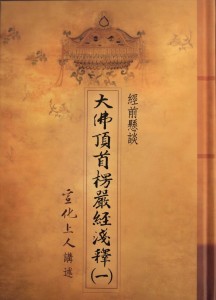 各位善知識:晚安!阿彌陀佛!
各位善知識:晚安!阿彌陀佛!
Good evening all Good and Wise Advisors, Amitofo!
今天晚上我想跟各位分享的是關於《楞嚴經》,這是對我很重要的(一部經典)。最近,我跟一位義工在討論《楞嚴經》,我告訴他我來聖城最主要的原因,是因為《楞嚴經》。
I was recently having a discussion with a volunteer and we were talking about the Shurangama Sutra. I told him that the reason I am at CTTB now is due to the Shurangama Sutra.
在2003年,我花了很多時間讀誦各種翻譯的大乘經典,也花了許多時間讀誦關於巴利文的經典。最後,因為Dr. Epstein(易果容教授)把這個《楞嚴經》放在網路上面,所以我看到了《楞嚴經》。
In 2003 I dedicated lots of my time to reading the Sutras. I read all of the major Mahayana Sutras that are available in English and many of the sutras in the Pali Canon also. Eventually I came across the Shurangama Sutra, which Dr. Epstein has made available on the internet.
我今天晚上的講稿裡面沒有寫的是《楞嚴經》對我非常重要,因為我看到的這部《楞嚴經》是有很多上人的解釋。那麼,這個解釋對我來講,跟經文一樣重要。而且,今天跟當時(上人講的時候)有同樣的重要性。
因為念了《楞嚴經》,使我改變了我對法與修道這條路的看法。第一,因為《楞嚴經》暴露了不正當的老師與不正當的教法。我在沒有看到《楞嚴經》的時候,我不知道正法與邪法的分別,在念完《楞嚴經》以後,我能夠得到擇法眼,所以我覺得非常地幸運。上人第一次講《楞嚴經》教他的西方弟子的時候,更表示出上人的智慧與遠見。從我的觀點來看,《楞嚴經》揭露了現在在西方佛法裡面最大的弱點,尤其是在大乘佛法裡面。
Reading the sutra really changed how I viewed the Dharma and the Path. First of all, it exposed deviant teachers and deviant teachings. Before reading the Shurangama Sutra, I didn’t know that there was such a distinction between Proper Dharma and Improper Dharma. I gained the Dharma-selecting Eye after reading the Shurangama Sutra, and for that I am very fortunate. The fact that the Venerable Master first taught the Shurangama Sutra when instructing his first Western disciples reveals his wisdom and insight. The Shurangama Sutra exposes the greatest weaknesses that have arisen in modern Buddhism, especially in the Mahayana tradition.
我告訴我這個朋友為什我覺得《楞嚴經》是如此的重要?尤其是對於佛法將來的興盛,一個很重要的原因,是因為《楞嚴經》花很大的篇幅注重在德行上面。那麼,在我看到《楞嚴經》以前,雖然我瞭解戒律是我們修行很重要的一部分,可是我並沒有瞭解到,它是扮演了這麼重要的一個角色。我不瞭解這個戒律是我們整個修行道路上的基石;假如沒有戒律的話,我們不可能達到無上的菩提心。所以,雖然我們可以在修行上不持戒,可是在這條不持戒的路上,我們不可能達到無上的菩提。
I was telling my friend the reasons why I think the Shurangama Sutra is so vital to the future prosperity of Dharma in the world. One important reason is because it focuses on the moral precepts. Before coming across the Shurangama Sutra, although I was aware that precepts were a part of the Path, I didn’t know that they played such a vital role. I didn’t realize that precepts are the very foundation of the entire Path, and that without precepts, you aren’t truly making progress towards Bodhi. You can certainly make progress on a path without upholding precepts, but such a path won’t lead to Bodhi, it will lead to something else much less desirable.
今天,在西方世界對佛法的討論中,基本上沒有關於持戒的事情。在西方一般的道場裡面,你聽不到(持戒)。你可以聽到很多喋喋不休的關於禪定,也可以聽到很多關於智慧,也可以聽到很多這個關於無我、慈悲跟空……;可是,你聽不到怎麼樣變成一個更好的人,怎麼樣可以發展你自己的德行,怎麼樣把你的心變得很清淨,然後把身體裡所有的不清淨的種子清除出來……,這種討論在今天我們西方的佛教道場裡面基本不存在。
In the West’s modern discourse on Dharma, there is no discussion about precepts. You simply won’t hear it anywhere. You’ll hear lots of Zen talk and lots of Prajna prattle. You’ll hear discussions about no-self and compassion and emptiness, but you won’t hear anything about becoming a better person, about developing virtue and goodness, about purifying one’s mind of all unwholesome thoughts and purifying one’s body of all unwholesome deeds. Such a conversation simply doesn’t exist right now in the West.
我的朋友告訴我:在一些禪定的中心裡面,在休息的時候,很多參加打坐的人,會跑到林子裡面去吸毒;吸完毒以後,又回來參加打坐。所以,在我的觀點裡面,我認為這就是最大的問題,我們不能夠知道,看到產生無明的原因。我不認為一個新來聽到佛法的人,可以把這兩件事情--無明與不守戒律連起來。假如他們可以把這兩件事情連起來的話,他們自然地會想要守戒。因為他們會看到:因為守戒,才可以把無明跟痛苦消除。
My friend told me how at meditation centers, during the breaks, the participants will go into the woods and take drugs, and then after the break ends they come back to meditate. In my opinion, the underlying problem with all this is a failure to see what the cause of ignorance is. I don’t think newcomers to Buddhism are able to make a connection between ignorance and the breaking of precepts. I think if they could make that connection, they would quite naturally want to uphold precepts because they would see their importance for overcoming ignorance and suffering.
當然,我的意見是:新來的人對這些問題不清楚,這不是他們的過錯。最大的過錯者是教他們的人,因為他們不能夠解釋無明,以及佛陀當年所教的正法。舉個例子來說:現在在西方,有一個不正確的教法,就是說:無明只是因為我們對雙元性的執著。所以,假如你的心能夠從這個雙元性整個出來的話,這個就是無上菩提。這樣的教法隱含著(這樣的意思):「你可以做很多很多壞事情,可是同時因為你不注意這個雙元性,所以你就不會造業,也不會在將來的生死輪迴中種下種子。」
The reason for their confusion isn’t their fault though. It’s the fault of those who are teaching them Buddhism. A major reason why they can’t make the connection between breaking precepts and ignorance is because those who are teaching them Buddhism aren’t explaining ignorance according to the way that the Buddha explained it. For instance, there is one false teaching that exists in Buddhism, which claims that ignorance is simply a matter of being attached to duality. If your mind can be free of all dualities and completely unattached, then that itself is Bodhi. Such a teaching implies that you can engage in all sorts of evil deeds, and yet because you are unattached and beyond duality, you are not creating karma and thus not planting seeds for future samsaric existence. Has this not been Mara’s teaching for time immemorial? Yet people have been tricked into believing that this is the Buddha’s Prajna.
難道這不是當年魔的教法嗎?可是,很多人都被這種教法影響,他們相信這就是佛的智慧。所以,假如有新入佛門的人,關於佛的智慧問題,有這樣不正確認識的話,那麼他們當然會相信守戒是不重要的。
Has this not been Mara’s teaching for time immemorial? Yet people have been tricked into believing that this is the Buddha’s Prajna. It makes perfect sense that someone with such a notion of Prajna would think that precepts are unimportant.
所以,在對任何新來的人傳法的時候,我相信最重要的一點,是我們必須為他們解釋,使他們瞭解佛當年為什麼要教我們如何修行。舉例說吧,我們不是要新來的人去達到一個無住、無依戀、無情的心。可是同時,這個心呢可以做許多事情,沒有管制,也沒有修持。所以,我們應該要教這些新來的人,應該達到一個心,這個心是沒有污染的,是很清淨的。
Therefore, at the beginning of any discourse about Buddhism with a newcomer, I believe it’s important that we first create for them a clear understanding of what it is the Buddha intends for us to accomplish by practicing Buddhism. For instance, we aren’t trying to accomplish an unattached, unfettered mind that engages in actions free from all restraint and shame. Rather, we are trying to accomplish a mind that is free from all defilements and impurity.
 所以,沒有自己的約束跟修持的時候,會把我們繫縛在生死輪迴中無法解脫。這個是因為我們不健全的身、口、意所造的業,才使我們在生死輪迴中一直輪轉。那麼,是不清淨使我們常在無明之中,使我們一直都在受苦。所以,當我們一旦瞭解到我們受苦是因為我們的自性被污染了,被不淨的東西所黏住。所以我們才會很容易知道,假如我們不守戒的話,僅僅是不守戒這一點,就會使我們的將來產生更多的無明,受更多的苦。因此,如果我們能夠瞭解我們跟佛唯一的不同之處,是佛的心是清淨的,我們的心是不清淨的。然後,我們才可以了解到,為什麼守戒律是如此的重要。
所以,沒有自己的約束跟修持的時候,會把我們繫縛在生死輪迴中無法解脫。這個是因為我們不健全的身、口、意所造的業,才使我們在生死輪迴中一直輪轉。那麼,是不清淨使我們常在無明之中,使我們一直都在受苦。所以,當我們一旦瞭解到我們受苦是因為我們的自性被污染了,被不淨的東西所黏住。所以我們才會很容易知道,假如我們不守戒的話,僅僅是不守戒這一點,就會使我們的將來產生更多的無明,受更多的苦。因此,如果我們能夠瞭解我們跟佛唯一的不同之處,是佛的心是清淨的,我們的心是不清淨的。然後,我們才可以了解到,為什麼守戒律是如此的重要。
Self-restraint and shame are not what is holding us back from liberation. It is unwholesome actions of body, mouth, and mind that are keeping us revolving in samsara. Impurity is what is keeping us ignorant and causing us to suffer. Once we can understand that suffering is due to our nature being covered over by impurities, then we can clearly see that breaking precepts is itself the cause of future suffering and ignorance. Once we can understand that the only difference between a Buddha and a worldly being is that a Buddha’s nature is pure, while a worldly being’s nature is impure, then we can clearly see the importance of precepts.
我常常問別人什麼是開悟?我得到了許多不同的答案,譬如說有不可思議的神通,或者是可以無所不知,或者是可以看到自我的空相……。任何這種樣的定義,關於覺得自己有無所不知的的這種無知,或者是不可思議的神通,假如這就是開悟的定義的話,那麼我們自然會認為,我們是不需要持戒的。雖然經典告訴我們,佛是有以上所講的這些能力。可是,以這樣的方法來解釋開悟的話,這就使我們完全迷失了我們的道路。
I have often asked people what they think enlightenment is. I will get answers such as: it’s having inconceivable spiritual powers, or it’s the attainment of omniscience, or it’s seeing into the emptiness of self. Any demon can experience no-self, can have delusions of omniscience, and can have inconceivable spiritual powers. If this is how we define enlightenment, then of course we won’t see any need for the precepts. Although the Sutras do teach that the Buddha possesses the above qualities, such definitions of enlightenment lose sight of what we are trying to accomplish.
雖然根據佛法,我們應該把我們自性裡面不清淨的東西除掉,可是佛告訴我們,開悟,是因為我們能夠不漏。當然,不漏的根本,是需要將我們的貪瞋癡熄滅掉。這樣我們才是真正地走在修行的路上。那麼,我們怎麼能夠說,我們在一條一直要把自己清淨的路上,可是同時,我們不能瞭解為什麼需要守戒律。因此,我覺得一個很重要的問題,對於西方新入佛門的人來說,我們沒有把佛法最終的目的為他們解釋清楚。假如我們不知道自己最終的目的是什麼,那麼,我們又怎麼能夠得到最終的解脫呢?假如我們不知道德行與開悟是相關的話,我們又怎麼能夠欣賞、瞭解我們需要德行呢?
According to the Buddha, we are trying to get rid of the impurities that cover over our intrinsic nature. The Buddha taught us that enlightenment is the ending of outflows—or klesha. The root kleshas he taught us to extinguish from our nature are greed, anger, and confusion. This is what we are trying to accomplish when we cultivate the Way. How can we claim to be on a path of purification such as this, and yet simultaneously not appreciate the need to purify our natures through maintaining precepts? Therefore, I think a major problem is that newcomers to Buddhism aren’t being explained what the end goal of Buddhism is. How can we work towards the goal of liberation if we don’t even know what it is? How can we appreciate the importance of virtue and purity if we don’t even see how it relates to enlightenment?
新入佛門的西方人,應該可以把這個不清淨跟痛苦劃一個等號。他們需要知道:這個貪瞋癡就是不清淨的本身,而這個不清淨是使我們受痛苦最大的原因。所以,他們需要知道,他們需要被告訴:不清淨就是使我們受痛苦的根本原因。如果我們可以守戒的話,那麼這個痛苦就會減低,因為我們使我們的自性更清淨。所以,能夠知道這樣的解釋--對於開悟以及得到最終解脫,在這樣的情況下,他們才能夠看到,守戒是如何的重要。
Newcomers to Buddhism need to be able to equate impurity with suffering. They need to be shown that the Three Poisons—greed, anger, and confusion—are impurity in itself and that such impurity is the root cause of suffering. They need to be shown how impurity is the cause of suffering and how upholding the precepts ends suffering by purifying one’s nature. By understanding what exactly enlightenment is when they are being introduced to the Dharma, they can then see how precepts are indispensable.
在《楞嚴經》裡面很注重的,就是為什麼我們要守戒。針對現在社會上對於佛法不能正確解釋的毛病,這樣的教法是一種解毒劑。從另外一個觀點來說,《楞嚴經》是對今天的佛法是這麼地重要,因為它教導我們關於五蘊不同的層次。我碰到過許多人,他們都告訴我,他們在修行上有了很高的境界,所以他們認為他們已經開悟了,這是一個很大的問題。因為一般人不瞭解開悟並不表示你有一個很深的修行上的境界。
The Shurangama Sutra stresses the importance of precepts. Such a teaching is the antidote to the sickness that the Dharma is suffering in today’s society. There is another way in which the Shurangama Sutra is vital to the Dharma today, and that is the way in which it teaches about the skandha states. I have come across many people who have had “spiritual experiences” and therefore think that they have become enlightened. This is another problem that arises because people don’t know what enlightenment is. They think enlightenment consists of having a profound, spiritual experience.
從我瞭解的觀點來講,《楞嚴經》能夠顯示,這種修行上的境界並不是重要的,因為它用了一種不同的語言。那麼,現在一般人所謂的修行上的境界,在《楞嚴經》中講,它只不過是五蘊中不同的層次而已。所以當把這些不同的經驗、不同的(體驗)歸入不同層次的時候,那麼一般人就不會變得很興奮地跑去跟別人說:「哦!我今天得到一個不同的層次!」因為這個樣子的話,《楞嚴經》是告訴人說,不同的修行境界,也不過是一種普通的層次而已,並且這些層次也不是恒常的,它們是常常變化的。
One way in which the Shurangama Sutra shows the unimportance of these spiritual experiences is by changing the language. What people today call spiritual experiences, the Shurangama Sutra calls skandha states. Labeling these experiences as states puts them into their proper perspective. No one can get excited and go up to someone and say, “Oh, I had the most amazing state!” Just the word “state” in itself reveals that the spiritual experience has no real value or importance and is just one of many other fleeting states.
在大乘佛法的另外一個傳統裡,他們用五蘊的不同層次,來衡量一位瑜珈修行者的進度。他會告訴修行者:在你修行中,假如你可以從一個層次到另外一個層次的話,你就會在這些層次中得到不同的修行經驗。所以,難怪有很多人覺得很迷茫:我們到底在佛法裡面要達到什麼樣子(結果)?在這個傳統裡面,他們希望達到五蘊的不同層次,因為他們認為這就是一個衡量成功的指標,而不是認為說,我們在修行的道路上,應該保持一個普通的心。
Within another Mahayana Buddhist tradition, skandha states are used as a measure to determine how advanced a yogi is. It teaches that as you advance through the stages in your practice, you will experience different states, and it describes the different experiences one will have as one progresses through the yogic stages. Based on this, it’s no wonder people have gotten so confused about what they are trying to accomplish in Buddhism. In that tradition they actually try to attain skandha states, thinking that these are indicators of success, rather than maintaining the teaching that “the ordinary mind is the Way.”
那麼,《楞嚴經》把這些不同的愚癡統統剖開,很清楚地剖開。我認為在今天這個世界上,《楞嚴經》是最重要的一部佛教經典,因為它可以把一般人從不正確的瞭解狀態,改變成為覺悟的精進。同時,它可以告訴人們:無上的菩提是把一個普通人慢慢地提到修行的層次上。
The Shurangama Sutra cuts through this delusion, and in this way, the Shurangama Sutra is the most valuable sutra that exists in the world today, in my own opinion. It can turn people away from the improper and towards the good. It can remind people of what Bodhi truly is and teach the Path that takes one to that destination.
我很抱歉!因為我還有一頁半的講稿,今天沒時間講,也許下次有機會再跟各位分享,謝謝!阿彌陀佛!
【編按:Brooks是年輕的美國人,為聖城的長住義工,並負責男眾義工的申請和接引。此篇講稿是他對佛法的體驗,中文係由即席翻譯所謄出,原意請以英文稿為主。】


 我現在想起在學校的一個老師,她辦公室的牆壁上面有一句話,就是:「你所教的是你自己。」我不知道這個翻譯是不是很正確,就是說你教的不一定是你教的書,而是你自己的生活經驗,你所學到的東西,你的道德觀念。這些其實你真的很少在課上會說,但是你的學生們會從你的身上看得出來。他們常常最記得的也是這個。比如你去關心一個學生,因為她看起來心情不太好。她常常記得的不是自己的成績如何,而是在她心情很差的時候,有一個老師會關心她。
我現在想起在學校的一個老師,她辦公室的牆壁上面有一句話,就是:「你所教的是你自己。」我不知道這個翻譯是不是很正確,就是說你教的不一定是你教的書,而是你自己的生活經驗,你所學到的東西,你的道德觀念。這些其實你真的很少在課上會說,但是你的學生們會從你的身上看得出來。他們常常最記得的也是這個。比如你去關心一個學生,因為她看起來心情不太好。她常常記得的不是自己的成績如何,而是在她心情很差的時候,有一個老師會關心她。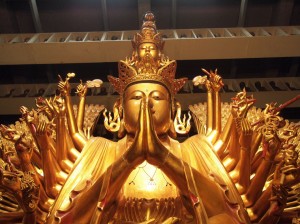 李嘉儀:諸佛菩薩,師父上人,各位法師,各位善知識,阿彌陀佛。我是李嘉儀,今晚輪到我來結法緣。我當前是培德女中的一位十二年級學生。我中文不是很好,如果我發的音或用的文法是錯的,請你們原諒我。
李嘉儀:諸佛菩薩,師父上人,各位法師,各位善知識,阿彌陀佛。我是李嘉儀,今晚輪到我來結法緣。我當前是培德女中的一位十二年級學生。我中文不是很好,如果我發的音或用的文法是錯的,請你們原諒我。 諸佛菩薩、上人、各位法師、各位善知識:我的名字是親涵近養,今天輪到我跟各位結法緣。如果我在講的當中有任何的錯誤,請慈悲指正來幫助我,讓我在下一次結法緣的時候能夠得以改進。
諸佛菩薩、上人、各位法師、各位善知識:我的名字是親涵近養,今天輪到我跟各位結法緣。如果我在講的當中有任何的錯誤,請慈悲指正來幫助我,讓我在下一次結法緣的時候能夠得以改進。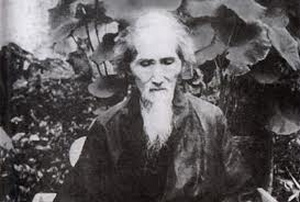 今天晚上是輪到個人學習講法,跟大眾結法緣。今天是虛雲老和尚的涅槃日,我想講講關於虛老的事蹟。虛老是近代的大德,住世120歲,在這麼漫長的一生中,他經歷過很多的事情,我也不知道重點要放在什麼地方。所以,如果講得不是很有條理,或者有講錯的地方,請指正。
今天晚上是輪到個人學習講法,跟大眾結法緣。今天是虛雲老和尚的涅槃日,我想講講關於虛老的事蹟。虛老是近代的大德,住世120歲,在這麼漫長的一生中,他經歷過很多的事情,我也不知道重點要放在什麼地方。所以,如果講得不是很有條理,或者有講錯的地方,請指正。
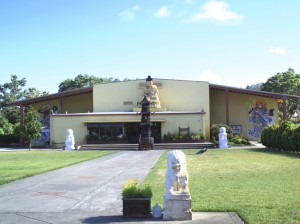 師父上人、各位法師、各位佛友:阿彌陀佛!
師父上人、各位法師、各位佛友:阿彌陀佛!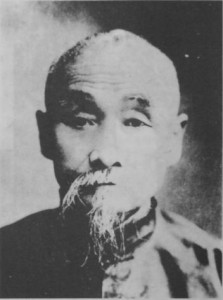 “那年在德惠縣講習,我兒子去了,他因為那地方正鬧大股胡匪,他嗔我招些女生講習,替我害怕,所以才大鬧而特鬧。他上堂急頭擺臉的說我不對,把教鞭敲碎了,喝了三壺水,我 一動也不動,我心裏話,胡匪也是迎天時來的,是為的收拾後天世界的,我也是迎天時來的,是為辦先天世界來的,同是迎天時來的,兩不相害,他又哪能傷我呢! 他不知道這個理,所以他才鬧,我又哪能怪他呢!所以才一言不發。那和歌利王割解肢體一樣,我一動也不動,正是割而不割呢。為父親的受兒子的罵,雖然罵幾天,也只是定志道,反正你是我的兒子,我絕不動。第二天他走了,我上堂說:「你們若有那樣一個兒子,你們能當起這個爹不?我一言不發,一動不動,就算是對 得起,你們常說是學我的道,若真照我當爹那樣去當就對了。”
“那年在德惠縣講習,我兒子去了,他因為那地方正鬧大股胡匪,他嗔我招些女生講習,替我害怕,所以才大鬧而特鬧。他上堂急頭擺臉的說我不對,把教鞭敲碎了,喝了三壺水,我 一動也不動,我心裏話,胡匪也是迎天時來的,是為的收拾後天世界的,我也是迎天時來的,是為辦先天世界來的,同是迎天時來的,兩不相害,他又哪能傷我呢! 他不知道這個理,所以他才鬧,我又哪能怪他呢!所以才一言不發。那和歌利王割解肢體一樣,我一動也不動,正是割而不割呢。為父親的受兒子的罵,雖然罵幾天,也只是定志道,反正你是我的兒子,我絕不動。第二天他走了,我上堂說:「你們若有那樣一個兒子,你們能當起這個爹不?我一言不發,一動不動,就算是對 得起,你們常說是學我的道,若真照我當爹那樣去當就對了。” 師父上人、各位法師、各位蓮友:大家晚安!我的法名朱果翔。今天晚間輪到我結法緣,練習作報告。
師父上人、各位法師、各位蓮友:大家晚安!我的法名朱果翔。今天晚間輪到我結法緣,練習作報告。 諸佛菩薩、上人、各位法師、各位善知識:阿彌陀佛!今天輪到沙彌尼親易近簡,藉著這個機會跟大家分享我參加萬佛寶懺的經驗跟感想。如果我有說得不如法的地方,請慈悲指正。
諸佛菩薩、上人、各位法師、各位善知識:阿彌陀佛!今天輪到沙彌尼親易近簡,藉著這個機會跟大家分享我參加萬佛寶懺的經驗跟感想。如果我有說得不如法的地方,請慈悲指正。
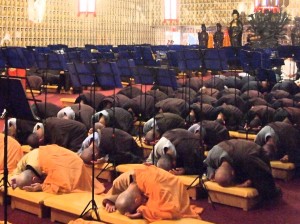 諸佛菩薩、宣公上人、各位法師,慈悲:今天近中要和大家分享禮拜萬佛懺的心得感想。
諸佛菩薩、宣公上人、各位法師,慈悲:今天近中要和大家分享禮拜萬佛懺的心得感想。 諸佛菩薩、師父上人、各位法師、各位善知識:今天晚上弟子張福麟上臺報告。
諸佛菩薩、師父上人、各位法師、各位善知識:今天晚上弟子張福麟上臺報告。